The Extinct #4 - The Great Auk
This week episode on the extinct will feature a bird which was once known as a beauty amongst birds, their black and white colouration and fearless nature earned them the position as religious symbols. How did such a beautiful creature turn out to now be listed amongst the extinct, lets find out on The Extinct #4
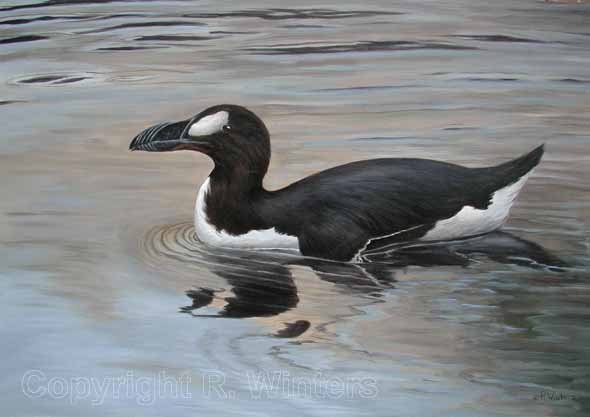 The Great Auk
The Great AukDescription
An adult of this bird species when standing measures about 75cm-85cm tall and it's weight is about 5kg with a wing length of about 15cm.The great auk was known to be a flightless bird. The male and female great awk are similar though they can be differentiated by their size mostly with regards to the femur and bill length.
For their breeding plumage, They are seen to have an upper part with black colouration; this colouration ranges from its head, wings, throat and tail.
The under part of the great auk has a white colouration which ranges through its belly, undertail and its belly. On the edge of its wing, it was known to have a white colouration which is visible even at the closure of its wings. Viewing from the front, a white area is noticed just in front of each eye.
Its bill was robust and black with a rigid nature, and its gape was known to be bright yellow. They were known for brown eye colour and webbed feet which were quite large, strong black and had placement a bit back on its body giving them good swimming and diving ability.
The non-breeding plumage of the great auk is seen to ditch the white patch located in front of that of the breeding plumage, and it's being replaced by a band and row of feathers coloured white. The male in this plumage was noticed to be similar to the females with a little size difference.
A juvenile great auk was known to have a bill less rigid than that of an adult, it's supposed black neck for the adult was known to be mottled white in colour, the white area at the front of the eye for the adult was not seen but an eye line which colours Grey extending below its ears.
Where They Were Found
They were found breeding on islands in the Atlantic. They were found in Greenland, British Islands, Iceland, France, Spain, Canada, and France.
The great awk migrate South from colonies after their breeding season to the Grand Banks in Newfoundland; Their bones were found far Florida and their range was also in Massachusetts
Feeding
They were known to eat in shallow water, and they feed mainly on fish.
According to findings of remains on Funk Island and ecological consideration, the Capelin and Atlantic menhaden was a favoured prey.Fishes suggested as prey were lumpsuckers, cods, Southern sculpins crustaceans and sand Lance.
Young ones were believed to feed on plankton and some fishes which were regurgitated by the adults.
Their Behaviors
They were not observed by scientists when they were in existence; their behaviour was described on layman's account which includes accounts by sailors. Also, much of its characters may be inferred from its relative, the razorbill and its remaining tissues.
They were known to walk slowly on land, and when running, it was awkward in short steps and known to be in a straight line. They were known to have few predators which include the White-tailed Eagle and the orca with the polar bear preying on colonies when resting.
They were known to have no fear of humans which contributed to their extinction. They make use of their bills aggressively mostly when humans caught them. It was believed they had a lifespan of about 20-25 years. They were known to have a fear of noise but are less frightened seeing something or someone. The great auk was known to be a good swimmer as they use their wings for propulsion when swimming underwater.
They were known to take dives into the water as deep as 1km. They can hold their breath for quite some time under water; they can also accelerate under water.
Reproduction In The Great Auks
Since they were not observed to an extent by historians, breeding behaviour can be somewhat not reliable but history tells that they begin to pair for breeding in early or mid period of May which follow nesting at cliff base usually in colonies
One egg comes from the mating between each pair which was known to be laid from the shore and on a bare ground
Its egg was recorded to be elongate and ovate with regards to shape; they were known to range from yellowish white down to ochre and pattern of brown, black or grey spots which are congregated on the on one end of the egg. The belief was that the difference between eggs helps parents recognise theirs in the colony.
Both parents take turns to incubate the egg till it hatches, that is for about 39-44 days. They also bear the burden of feeding the chick together. After two to three weeks, the young bird leaves the land and head for the water. The Great auk mature sexually after 4-7 years.
HOW THEY WENT EXTINCT
Many factors contributed to the extinction of this bird. The fact that they lay only a single egg did not help against exploitation. Hunting by humans was a major factor which contributed to their extinction. The great auk was used as an important part of the Native American culture which includes use as symbolic items and food source
The early explorers use this auk not only as a food source but also as bait for fishing which reduced it's number further.
They received their protection in 1794 from Great Britain to stop the killing of this bird for its feather, but the use of bait was permitted which further led to their decrease.
Also, museum desired their skin for display and preservation and began collecting them from their colonies. Allerged last pair of this bird were killed on 3rd June 1835 by the request of a merchant for a specimen of this bird, they were found incubating their egg, and the adults were strangled, and eggs smashed with the boot.
WE FAILED THE GREAT AUK, BUT THERE IS HOPE FOR THE GIANT IBIS
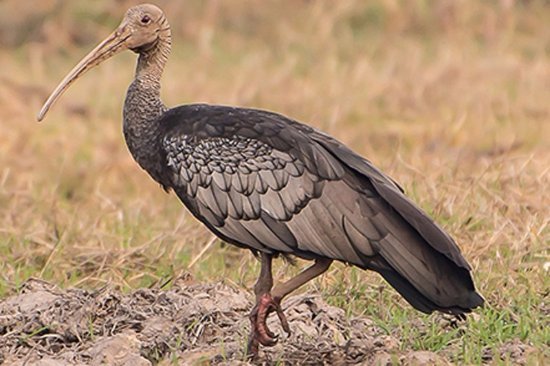
Source: The Giant Ibis
This is a very majestic bird and is now amongst the most endangered birds in the world. They are native to wide rivers, seasonal waters and marshes with few of them in the southern part of Laos.
They can stand up to 1 meter tall, weighing around 4 kilograms. An estimation States that only a hundred of this bird is currently in our world
The main cause of them being endangered is the use of wetlands for cultivation purposes and the deforestation of forests. They are also affected by the increase in human population in Cambodia hence the need for more space. They may also be used as meat by humans, not being able to witstand predation led to their low population.
Also, climatic changes have also affected this bird affecting their habitat for breeding.
Conservative measures have been put in place which includes protection of their nest with metal belts which prevent their predators from having access to them, but the continued increase in human population remains a big factor to the endangerment of the great ibis.
To conserve this species, we must implement increased ecotourism and education of the locals on the near extinction of this bird to help them survive just like some other animals had.
My Stand
Loss of the Great Awk was a huge loss to the Animal Kingdom, it's sad we now have to only read about them and see pictures of them in artworks and musuems. Just like seen, their extinction was mainly due to human activities, I read a story of how three men from St. Kilda saw this bird when sailing the sea,they noticed it's little wings and white spots on its head, the sight caught then and they decided to keep it alive on their boat, this happened for three days until they were faced by a heavy storm, with the belief that this flightless bird was the cause of the storm, (a witch they tagged it) they killed it by beating with a stick till death, how cruel men can be. Below is a tribute video to them.
Above is an endangered bird, know to be amongst the most endangered birds in the world,the Great Ibis, there is a need for conservation of this bird, though they are now receiving a sort of protection by law, we have to put more effort to make sure they see generations to come, starting with educating the public about them.
Have you seen other episodes of this series?
The Caribbean Monk Seal
Passenger Pigeon
The West African Black Rhinoceros
REFRENCE
The Great auk, extinct
About The Great Auk
General Information Of The Great Auk

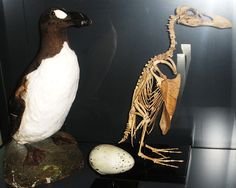
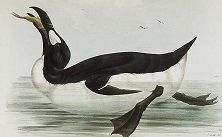
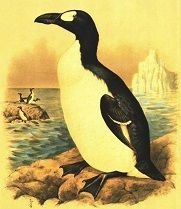
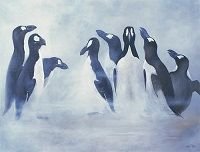
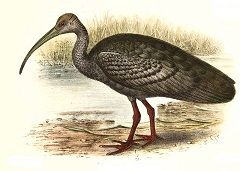
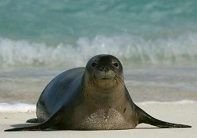
It is important to realize the thousands of species that have disappeared mainly because of human action.
Today is to make future generations aware of
the urgency of protecting animal species and nature in general without which we could not survive in the long run.
I work in too, by posting on birds and insects mainly from France, and on the importance of valuing your garden to preserve these species.
Resteemed to over 10100 followers and 100% upvoted. Thank you for using my service!
Send 0.100 Steem or 0.100 Steem Dollar and the URL in the memo to use the bot.
Read here how the bot from Berlin works. News you will find under the hashtag #resteembotnews.
Please help us grow and use our link to trade #IOTA #BTC #ETH and a lot of more at one of the biggest exchanges. https://www.binance.com/?ref=10230705
@resteem.bot
beautifuo creaure 😱
extraordinary postings deserve to be trending
Thanks, it's nice having you here :)
Ya...Succes for all
Congratulations @preciousdave, this post is the sixth most rewarded post (based on pending payouts) in the last 12 hours written by a Newbie account holder (accounts that hold between 0.01 and 0.1 Mega Vests). The total number of posts by newbie account holders during this period was 3795 and the total pending payments to posts in this category was $4729.45. To see the full list of highest paid posts across all accounts categories, click here.
If you do not wish to receive these messages in future, please reply stop to this comment.
very interesting post!)
Thanks Anton.
Great post, really enjoyed it and the research is getting much better! Worthy of the large upvotes :)
Your first photo is a Razorbill which is the closest living relative to the Great Auk :) might be worth switching it!
I Just did that, thanks @amavi, it's been all good knowing you here, i appreciate the assistance. Being better, I owe it all to you :)
Are you sure about this? 1km is very very deep, damn birds were almost submarines, it's a shame so many species become exctint because of humans...
I sometimes wonder if new species are evolving to better deal with humans or if evolution isn't fast enough to deal with the level of destruction we do to the environment...
Just like I wrote , they were not really studied by scientists when in existence, their behavioral pattern were inferred from descriptions based on layman's account, it's a shame they are lost as we will not know more about them, I just hope we do better at conserving the endangered in our midst .
thanks for this wonderful research,its nice keep this good vibes always
Thanks @efemena, nice having you here.
Thank you for creating this, I think what your doing is really important.
When I was a kid I thought extinction of species was something that just happened in the past, I don't know how many other people like me are shocked to know its happening today. Most of the natural land mass has been taken for animal agriculture, that means free animals have less and less space, their habitats are constantly under threat.
If you or and anyone else is interested in transformation and protecting planet earth,
please join the FOOD REVOLUTION!
check my intro out....
http://steem.link/bLD24
And article, Mc D’s vegan burgers
http://steem.link/7sUm7
hope you like :) ✌ 🐮
I just joined steemit, follow and I follow back and upvote